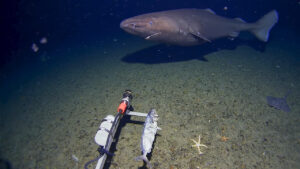Yesterday, a fatal shark attack in Sydney, Australia captured attention worldwide. When a great white killed a swimmer off Little Bay Beach, it triggered not only an exhaustive search but also a media firestorm.
Many outlets have focused the lens on sharks, but not in a way that does anything good for the animals. While the death of a swimmer is obviously a tragedy, the viral nature of the story vilifies sharks at a time when they are more vulnerable than ever.
Below, ExplorersWeb takes a closer look.
Sydney shark attack: Headline writers go for the kill
Take a deep breath and read this long-winded headline by The Daily Mail:
The chilling reason behind Sydney’s deadly shark attack: Expert explains why killer 4.5metre great white was so close to the area – as graphic reveals how the terrifying ‘vertical’ mauling unfolded.
Words like “chilling”, “killer”, and “terrifying” cause two effects in the headline: 1) sensationalize the story and 2) demonize sharks.
Meanwhile, The Guardian wrote: “Sydney shark attack: authorities say large great white responsible for death of 35-year-old man.”
How is it fair to hold a wild animal “responsible” for the death of a human? Especially one who voluntarily entered the animal’s habitat?

A white shark swims with other species off the coast of Mexico. Photo: Terry Goss
Even the authorities regulating the search appear to recognize that the great white in question deserves fair treatment. Australia’s Department of Primary Industries (DPI) is using non-lethal baited lines to try to catch and relocate the shark.
We asked an expert about what the episode means for the apex predators. Paul Cater Deaton is an underwater filmmaker and shark expert. He holds certifications in shark biodiversity, biology, and conservation through the University of Queensland and Cornell University.
He stated that humans are not a food source for sharks. When we venture into their habitat, there’s a small possibility that sharks will mistake us for food.
“We’re talking about somebody who was in the shark’s habitat,” he said. “The shark obviously mistook it for one of its food items. Humans are not on the menu.”
Statistically, Deaton is right. Shark attacks against humans are extremely rare — the International Shark Attack File, or ISAF, recorded just 16 fatal attacks worldwide in 2020-21.
Humans imminently threaten sharks, but also rely on them
Sharks can use all the help they can get from humans — recently, they haven’t gotten much. Over the past 50 years, overfishing and other human activity has decimated sharks. The shark fin soup industry and accidental “bycatch” by commercial fishing boats using gill nets are significant problems.

A thresher shark caught in a gill net in Mexico’s Gulf of California. Photo: Brian Skerry
Now, the majority of species of the keystone ocean predators face extinction.
A 2021 study published in the scientific journal Nature found that open ocean shark populations have dropped a staggering 70% since 1970. The authors pointed out that the outlook is probably even bleaker than that.
Nathan Pacoureau is a marine biologist at Simon Fraser University in British Columbia, Canada, and the study’s lead author.
“There is a very small window to save these iconic creatures,” he said. He says that the situation jeopardizes marine ecosystems, and in turn, people all over the world who rely on these ecosystems for food. More than three-quarters of oceanic shark and ray species are now threatened with extinction.
Meanwhile, sharks play a vital role in supporting healthy, diverse ocean ecosystems. As top predators, they help regulate every ocean species below them in the food chain — all the way down to seagrass and algae. Without sharks, habitat imbalances lead to chain reactions like reef death and species extinction.

Sharks are key to healthy marine habitats like Australia’s Great Barrier Reef. Photo: Leonard Low
Upshot: What’s the real danger?
Recent good news for sharks includes scientific evidence that lighted fishing nets can dramatically reduce their susceptibility to accidental catch.
Still, the proliferation of aggressive headlines about the Sydney incident shows that public perception of sharks has a long way to go.
“When people write provocative headlines and articles about shark attacks, they do it because they want to sell the story,” Cater Deaton said. “Actually, sharks are very cautious, inquisitive creatures. Humans cause great loss to sharks; the statistics are staggering.”
One popular study found that humans kill anywhere between 63 and 247 million sharks every year. Translation? Two sharks per second, on the low end.
The Daily Mail’s headline is technically accurate in one key detail: yes, sharks are “killers.” But we should be far more terrified of losing them than of being attacked by them.






